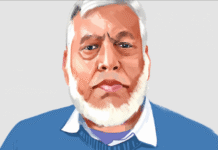A man who for decades was one of the most distinctive voices of his culture has passed away leaving his fans sad and the rest wondering if the vacuum will ever be filled. The iconic song “Coffeehouse” enthralled adda loving Bengalis for long and this song brought a deluge of nostalgia to many. The song built around memories of a bunch of friends who would regularly meet from 4 to 7.30 everyday is itself a memory now. The singer lives on in his song but the corpus of Manna Dey was much bigger than any singer from the Bengali speaking world.
He ruled the waves wherever his songs were felt and as a bilingual singer in Bengali and Hindi, he had a following that was at par with the greatest of them all whether Md. Rafi, Mukesh or Kishore. He belonged to India and not just Bengal and that is what makes his departure such a loss. For many people in more than one country, it was truly an era that ended with him.
* * *
Manna Dey was part of the several Bengali speaking musicians who populated the Bombay film world. It included some of the most illustrious names ever, whether it was music directors like Salil Chowdhury or Sachin Dev Burman and singer like Hemanta, Kishore, Manna Dey and a few others. Kishore Kumar was different from this lot because he had grown up in Uttar Pradesh but the rest were from Kolkata and it made them special. Of them, Hemanta was the more melodious, lilting singer with hits like “Yeh raat yeh chandni”, “Janey kiu log”, “Ai merey dil kahin aor chal” and many more; Kishore was eternal for his light hearted songs generally but Manna Dey had a range unsurpassed by none. In some ways, the three gods of Hindi cinema songs were Md. Rafi, Mukesh and Manna Dey. Kishore joined a bit late but the kind of respect for music which they gained has not been achieved by any singer till today.
* * *
On a list made of the ten most popular songs of the Hindi music world, at least three would be by Manna Dey. The songs that have literarily become immortal are — “Laga chundri mey daag”, “Ay meri johra jabeen,” “Ay merey pyarey watan”, “Ek chatur naar karkey singar” the last one in duet with Kishore. These songs all 50 years old are still played by millions and share top spots on the YouTube. Two other songs “Zindigai keysi hai paheli” and “Pyar hua ikrar hua” have become milestones of the romantic songs world.
Manna Dey was a superstar in at least two levels. In Bengal, he was one of its greatest singers whose gravely voice was endearing to all. But he had another world which was the Bollywood where he supplied some of its greatest hits. Here he was a star who didn’t belong to a province but the entire nation.
* * *
That doesn’t mean he wasn’t a superstar in his native clime. “Kotodin dekhini tomai,” “O amar mon jamunar”, “Eki onge ato rup”, “Teer bhanga dhew” to name a few of the many that captured Bengali hearts. They were almost all romantic songs and his “jilted” sad songs were particularly relished. But he did lack the awesome range of Hemanta Mukherjee — the monarch of Bengali singing whose reach was everywhere. Perhaps because of his social activist background, Hemanta stretched his wings wider to include many worlds and his mastery of Tagore was another that made him unparalleled. Manna Dey was a much less visible presence in these worlds and his repertoire was limited to some extent. But perhaps because he was not typecast and his voice was not stereotypical and from early on he did all kinds of songs, the Coffeehouse song was possible.
According to many surveys, it is one of the most popular songs of all time of the Bengali speaking world and one that reaches out to every group, every age, every shade of people. It is the urban Bengali, his aspiration, angst and reality all rolled into one song and captured effortlessly by him. Few singers anywhere in the world ever get a chance to sing a song like this. Perhaps he should have sung more songs like this one, a truly modern song, contemporary and urban, liberated from traditional narratives of romance and patriotism to something that was very firmly located in real space and time with real life people and events and ambience to give it a sense of the contemporary that few songs can. He had straddled the world from Tagore to Nachiketa and had reigned even in its final version too.
This one song alone could offer him immortality.
* * *
Manna Dey had married a lady from South India and lived in Bangalore though his links with Kolkata were firm. But in the end, he left the slightly narrower patch of Bengal and became much more of an Indian. And in doing so he became a greater star that shone in India’s national sky.
Even after the last cup of coffee was drunk and everyone had gone home leaving all the chairs behind, he will always be there humming a tune everyone will listen to.
– See more at: http://opinion.bdnews24.com/2013/10/26/adieu-manna-dey-the-coffeehouse-adda-is-finally-over/#sthash.lUXe9Int.dpuf
A man who for decades was one of the most distinctive voices of his culture has passed away leaving his fans sad and the rest wondering if the vacuum will ever be filled. The iconic song “Coffeehouse” enthralled adda loving Bengalis for long and this song brought a deluge of nostalgia to many. The song built around memories of a bunch of friends who would regularly meet from 4 to 7.30 everyday is itself a memory now. The singer lives on in his song but the corpus of Manna Dey was much bigger than any singer from the Bengali speaking world.
He ruled the waves wherever his songs were felt and as a bilingual singer in Bengali and Hindi, he had a following that was at par with the greatest of them all whether Md. Rafi, Mukesh or Kishore. He belonged to India and not just Bengal and that is what makes his departure such a loss. For many people in more than one country, it was truly an era that ended with him.
* * *
Manna Dey was part of the several Bengali speaking musicians who populated the Bombay film world. It included some of the most illustrious names ever, whether it was music directors like Salil Chowdhury or Sachin Dev Burman and singer like Hemanta, Kishore, Manna Dey and a few others. Kishore Kumar was different from this lot because he had grown up in Uttar Pradesh but the rest were from Kolkata and it made them special. Of them, Hemanta was the more melodious, lilting singer with hits like “Yeh raat yeh chandni”, “Janey kiu log”, “Ai merey dil kahin aor chal” and many more; Kishore was eternal for his light hearted songs generally but Manna Dey had a range unsurpassed by none. In some ways, the three gods of Hindi cinema songs were Md. Rafi, Mukesh and Manna Dey. Kishore joined a bit late but the kind of respect for music which they gained has not been achieved by any singer till today.
* * *
On a list made of the ten most popular songs of the Hindi music world, at least three would be by Manna Dey. The songs that have literarily become immortal are — “Laga chundri mey daag”, “Ay meri johra jabeen,” “Ay merey pyarey watan”, “Ek chatur naar karkey singar” the last one in duet with Kishore. These songs all 50 years old are still played by millions and share top spots on the YouTube. Two other songs “Zindigai keysi hai paheli” and “Pyar hua ikrar hua” have become milestones of the romantic songs world.
Manna Dey was a superstar in at least two levels. In Bengal, he was one of its greatest singers whose gravely voice was endearing to all. But he had another world which was the Bollywood where he supplied some of its greatest hits. Here he was a star who didn’t belong to a province but the entire nation.
* * *
That doesn’t mean he wasn’t a superstar in his native clime. “Kotodin dekhini tomai,” “O amar mon jamunar”, “Eki onge ato rup”, “Teer bhanga dhew” to name a few of the many that captured Bengali hearts. They were almost all romantic songs and his “jilted” sad songs were particularly relished. But he did lack the awesome range of Hemanta Mukherjee — the monarch of Bengali singing whose reach was everywhere. Perhaps because of his social activist background, Hemanta stretched his wings wider to include many worlds and his mastery of Tagore was another that made him unparalleled. Manna Dey was a much less visible presence in these worlds and his repertoire was limited to some extent. But perhaps because he was not typecast and his voice was not stereotypical and from early on he did all kinds of songs, the Coffeehouse song was possible.
According to many surveys, it is one of the most popular songs of all time of the Bengali speaking world and one that reaches out to every group, every age, every shade of people. It is the urban Bengali, his aspiration, angst and reality all rolled into one song and captured effortlessly by him. Few singers anywhere in the world ever get a chance to sing a song like this. Perhaps he should have sung more songs like this one, a truly modern song, contemporary and urban, liberated from traditional narratives of romance and patriotism to something that was very firmly located in real space and time with real life people and events and ambience to give it a sense of the contemporary that few songs can. He had straddled the world from Tagore to Nachiketa and had reigned even in its final version too.
This one song alone could offer him immortality.
* * *
Manna Dey had married a lady from South India and lived in Bangalore though his links with Kolkata were firm. But in the end, he left the slightly narrower patch of Bengal and became much more of an Indian. And in doing so he became a greater star that shone in India’s national sky.
Even after the last cup of coffee was drunk and everyone had gone home leaving all the chairs behind, he will always be there humming a tune everyone will listen to.
Source: Bd news24










